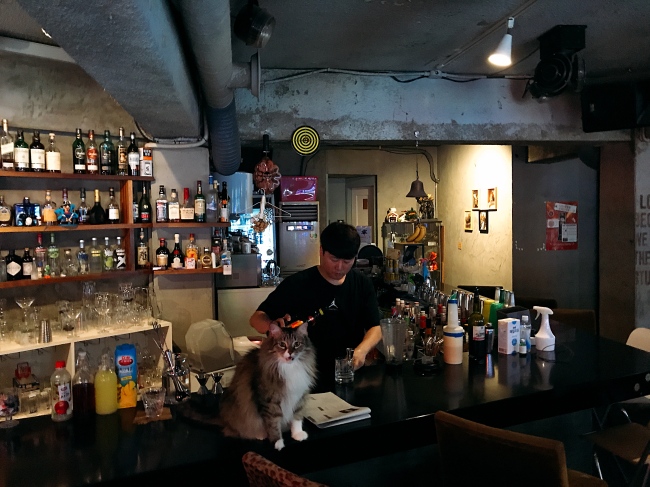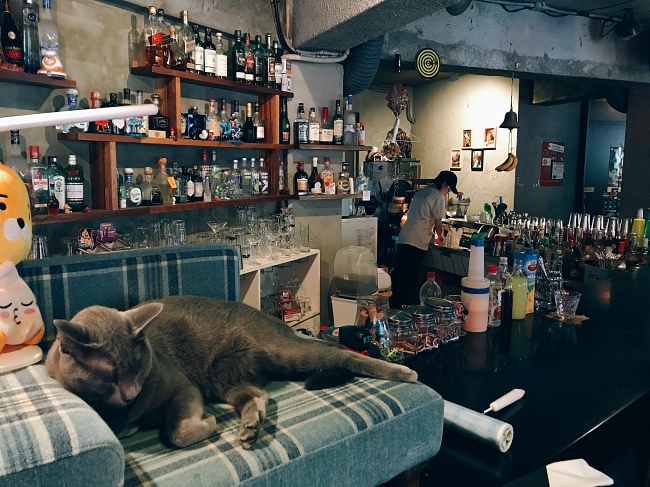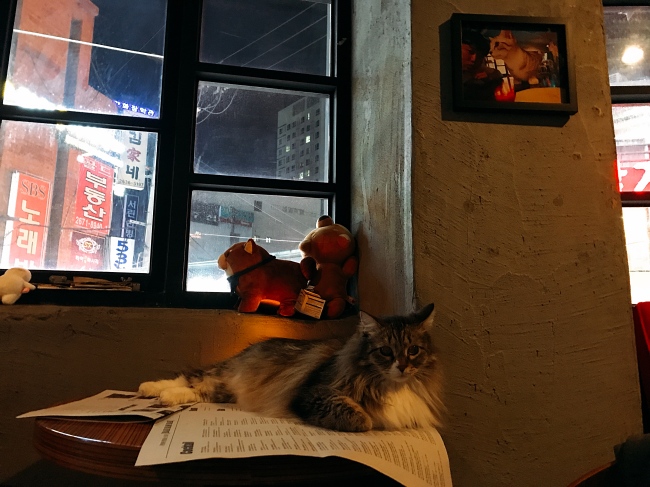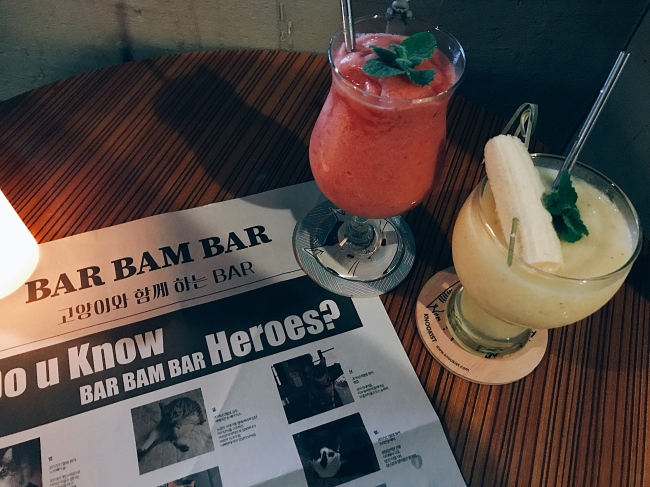[Weekender] Seoulites seek coexistence with stray cats
Human-cat cohabitation efforts in Seoul begin at city's bars and cafes
By Kim ArinPublished : Oct. 25, 2018 - 16:32
Change is taking place on the streets of Seoul for human-cat cohabitation.
The Seoul city government’s stray cat policy centers on population control, but there’s more to homeless cats’ lives than reproductive impediment. Where the city government fails to fill in, people who are in touch with their feline neighbors on a daily basis are paving the way for humans and street cats to live together.
For as long as anyone can remember, cats have not been the most beloved animals in Korea, often perceived as “wily” creatures that cause trouble for people, or even as an evil omen. The negative sentiment has sometimes extended to those who care for alley cats, called “cat moms” regardless of the caretaker’s sex and subject to derision or even criminal acts. Cat moms report constant harassment and threats from people who simply do not want cats in their neighborhood.
Seoul’s local business owners have become active forces in making the city a better place for cats without homes. Not only are they tending to the homeless cats, they have turned their businesses into homes for cats rescued from the street.
The Seoul city government’s stray cat policy centers on population control, but there’s more to homeless cats’ lives than reproductive impediment. Where the city government fails to fill in, people who are in touch with their feline neighbors on a daily basis are paving the way for humans and street cats to live together.
For as long as anyone can remember, cats have not been the most beloved animals in Korea, often perceived as “wily” creatures that cause trouble for people, or even as an evil omen. The negative sentiment has sometimes extended to those who care for alley cats, called “cat moms” regardless of the caretaker’s sex and subject to derision or even criminal acts. Cat moms report constant harassment and threats from people who simply do not want cats in their neighborhood.
Seoul’s local business owners have become active forces in making the city a better place for cats without homes. Not only are they tending to the homeless cats, they have turned their businesses into homes for cats rescued from the street.

Meet Lee Hee-young, who owns cocktail bar Bar Bam Bar and looks after former and present stray cats. He’s a cat rights advocate who shies away from the use of the term “pet,” a word whose undertones of ownership he sees as a pejorative. He prefers the term “companion.”
Bar Bam Bar has earned a measure of fame on Instagram, with thousands of posts hashtagged under its name. Since a cocktail bar with an abundance of furry friends is a rare sight, there’s certainly a hip factor to the equation. Located in a popular restaurant alley of Yeongdeungpo, southwestern Seoul, the area around the bar is frequented by many stray cats.
Lee says Bar Bam Bar was not always the “cat cocktail bar” it is now known as. The bar opened its doors to its first cat, Bam, in 2013. Bam was found through an online advertisement looking for his new caretaker. Afterward, Lee started taking care of stray cats in the alley, eventually rescuing and adopting a number of them. Most of Lee’s cats are rescued from the streets or given up by former owners.
Due to the overwhelming presence of uncared-for cats in the area, many business owners like Lee have taken it in their hands to tend to the cats.
“Many shop owners feed the cats, clean up after them, take them to vets for vaccinations, treatment and neutralization,” Lee said.
The prime motive behind their helping hand? The homeless cats are a product of human indiscretion.
“There’s a ton of lodging businesses around here, and you will surprised how many cats are brought in discreetly for an overnight stay,” he said. The owner is gone the next morning leaving the cat behind -- who will most likely become the latest addition to the district’s stray cat community.

Lee stressed, however, that individual efforts fall short. The cats in the streets are malnourished, prone to infection and horrible treatment from people and sometimes killed by cars. “There has to be a citywide effort,” he said, confessing he feels he’s “making a plea,” with heartfelt desperation in his voice as he made his case for a municipal plan to confront the city’s feline conflict.
“Seoul’s TNR (trap-neuter-return) program does not take into account the territorial instinct of cats,” Lee explained. “Oftentimes we witness the neutered cats by the city released in a completely alien district of the city instead of the previously inhabited area, which leads to a lot of distress for the cat.” While Seoul city’s statement posted April 9 on its official website states that a trapped and neutered cat is “returned to the area it was previously captured at,” that is not always the reality.
Since people and cats are wildly different species, people need to take more consideration to understand and exist in peace with cats. There has to be more thought into cat adoption than a mere “aww, it’s cute.”
“Cats are given up shortly after being adopted because people realize too late that they are not just pretty fluffs to look at,” said Cho Ah-yeon, owner of the Planet Earth Cats cafe, home to 30 rescued cats. Even after spending years as a foster mother of 30 cats at the cafe, 16 at home, a dozen at shelters and more in the streets, she said she is “still learning.”
“Some very realistic considerations are if you can spend 5 million to 10 million won ($4,400-$8,800) for your cat in case of medical emergency, which is hardly an exaggeration. Having a cat means that you should sometimes be willing to forgo your own daily agenda to be with your cat,” Cho said.

The social media fame of cat cafes and cat bars has not turned all rosy.
Lee attests to having received inquiries from others looking to replicate the idea of having cats in stores. When the idea was executed though, the results were quite tragic. The cats were treated as a “consumer attraction,” “mere accessories, like an indoor decor” or a hip trend, sometimes leading to abuse.
“Cats are territorial, and lots of cats in small spaces can lead to no good,” Cho said, expressing deep skepticism of commercial cat cafes and bars.
All 16 cats at her household were moved from Planet Earth Cats after the cat failed to find a new family after four to five years, at which point she decided there was little chance of adoption and the cat needed more space. When asked about downsides to having nearly a dozen cats, Lee likewise answered that he’s “sorry for not having a bigger space” for all his cats.
Seoul is apparently doing little to regulate the presence of animals in stores, according to the two caretakers of multiple cats. To keep cats at the store “all you have to do is get food hygiene regulation education and that’s it,” the Planet Earth Cats owner said.

There is certainly a brighter side to building a brand name around cats. Enhancement in the public perception of cats is one factor.
Places like Lee’s bar and Cho’s cafe enable everyday encounters between cats and people. “People have grown a lot more accepting of cats compared to before,” Cho said. “It’s one of the good things about the recent ‘cat popularity.’”
Another obvious sunny side is the increase in awareness for and cases of abandoned cat adoption.
While bars are less common, Seoul has plenty of cafes for abandoned cats that have become a more approachable option for people seeking prospective cats to adopt.
Cho’s cafe opened in 2012 with the intention of providing a space for adopting abandoned cats. Since its inception, Planet Earth Cats has sent about 200 former stray cats off to new families. Cho said she keeps track of all the adopted cats to make sure they are provided proper care.
Seoul now is home to an estimated 139,000 stray cats who live among some 10 million people. The movement is now well under way to make peace with the furry neighbors, as a path for human-cat coexistence is being paved in Seoul’s alleys.
By Kim Arin (arin@heraldcorp.com)








![[Kim Seong-kon] Democracy and the future of South Korea](http://res.heraldm.com/phpwas/restmb_idxmake.php?idx=644&simg=/content/image/2024/04/16/20240416050802_0.jpg&u=)








![[KH Explains] Hyundai's full hybrid edge to pay off amid slow transition to pure EVs](http://res.heraldm.com/phpwas/restmb_idxmake.php?idx=652&simg=/content/image/2024/04/18/20240418050645_0.jpg&u=20240418181020)

![[Today’s K-pop] Zico drops snippet of collaboration with Jennie](http://res.heraldm.com/phpwas/restmb_idxmake.php?idx=642&simg=/content/image/2024/04/18/20240418050702_0.jpg&u=)